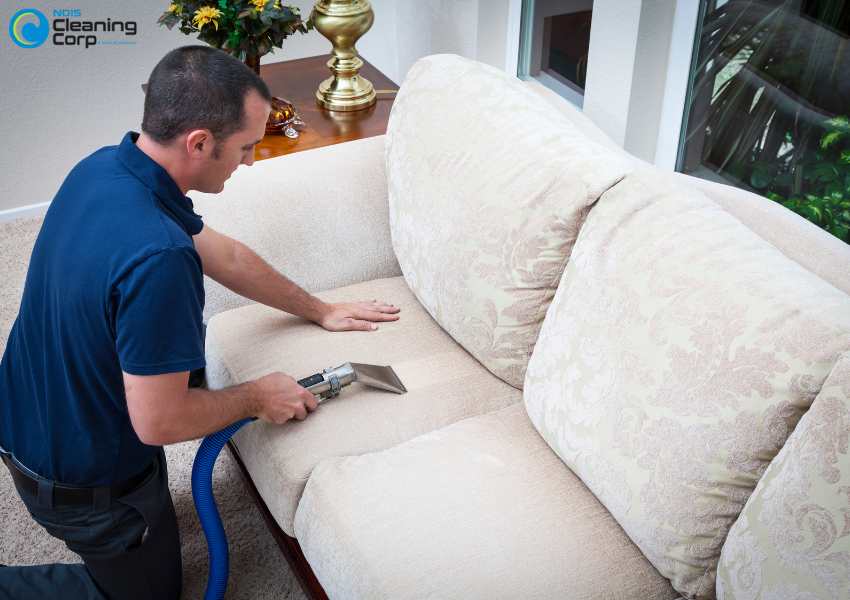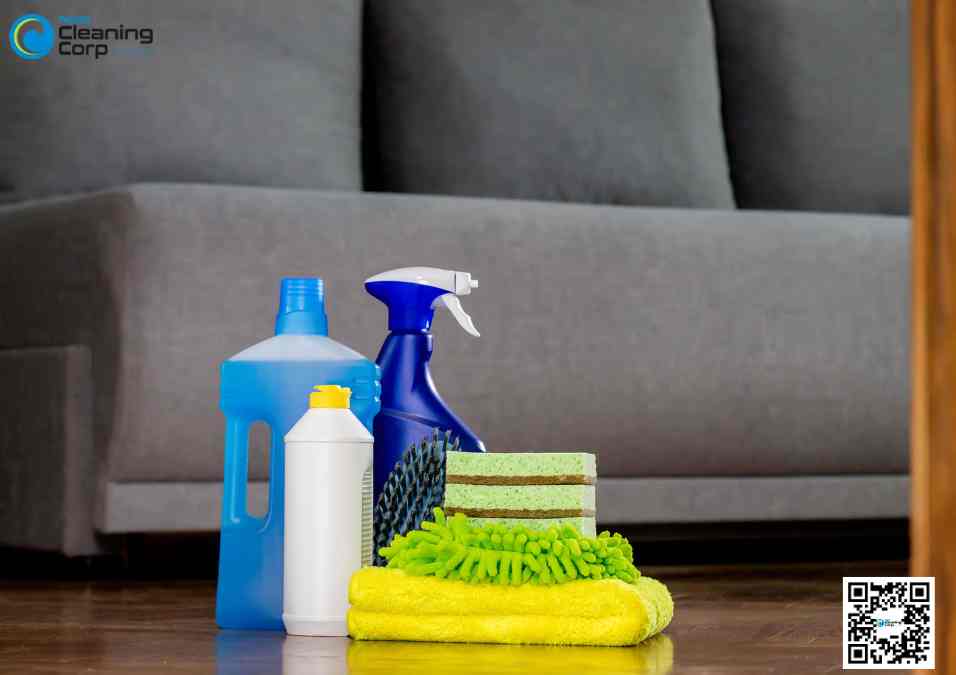Does the NDIS Fund Cleaning Services?
Yes. The NDIS does fund cleaning services — but it...
The benefits of living in a clean, safe home touch on every aspect of life, from physical health to emotional stability and the overall sense of independence. For people with disabilities, like many of our participants under the National Disability Insurance Scheme (NDIS), maintaining a clean, safe environment isn’t just a nice-to-have—it’s essential for daily living.
Having a well-maintained home provides a solid foundation that supports well-being, both physically and mentally. Cleanliness is closely tied to health, and in cases where immune systems are weakened or compromised, a clean environment can help prevent illnesses and infections. Safety, too, is key, especially for those with mobility challenges who may face hazards like cluttered walkways or unsecured furniture. A clean, well-organized home reduces the chances of tripping or falling, which can be devastating for someone already managing health limitations.
At NDIS Cleaning Corp., we see every day how creating a safe, healthy space can change lives. For some of our participants, though, maintaining that level of cleanliness can be an enormous challenge, especially without the right assistance. Imagine trying to sweep or mop a floor if you’re struggling with limited mobility or facing mental health conditions that make organizing feel overwhelming. This is where NDIS-funded support services play such a vital role. We’re here to help NDIS participants not only achieve but sustain a home environment that truly supports their needs and brings comfort and peace of mind.

An unclean environment isn’t just unpleasant; it’s a health risk. In fact, we often underestimate the impact a tidy home can have on our physical health, especially for those with underlying health conditions. Dust, mold, and allergens can easily collect in cluttered spaces or areas that are hard to reach for regular cleaning, leading to respiratory issues or worsening allergies. For some participants with compromised immune systems, an unclean environment increases their vulnerability to infections and illness.
But the good news? Regular cleaning can make a remarkable difference. For example, we had a participant named Sarah, who used to suffer from frequent colds and sinus infections due to dust and allergens building up in her small apartment. She was unable to reach certain areas to clean, which led to an unhealthy buildup of dust in corners and behind furniture. Once she started receiving regular cleaning services through her NDIS plan, her respiratory issues decreased dramatically. Sarah now feels more energized and rarely faces the discomfort of allergies that she once battled.
A clean home sets the stage for better health, which means fewer medical appointments, fewer medications, and a higher quality of life overall. It’s a simple but powerful step that makes a big difference.
It’s no secret that our environment affects how we feel. Just think about how much more relaxed you feel walking into a freshly cleaned room versus one cluttered with dishes, laundry, or paperwork. A clean home isn’t just about aesthetics; it can reduce stress and anxiety levels, helping individuals feel more in control. For people dealing with disabilities, that peace of mind can be especially valuable.
One of our participants, Mark, struggled with anxiety and often felt overwhelmed by his living space. His home had become cluttered over time, and he wasn’t sure where to start. With support through NDIS, he received help with decluttering and organizing his home in a way that worked for him. Mark told us that every time he walks into his clean, organized space now, he feels an immediate sense of calm and control that he hadn’t felt in years.
Living in a clean, orderly home can restore that sense of control over one’s surroundings, helping participants to feel safe, comfortable, and even motivated to engage more with their environment. There’s an undeniable boost in self-esteem and mental clarity that comes from knowing your space is in order.
For NDIS participants, living in a safe and organized space can mean the difference between relying on others and experiencing the freedom to move independently. Clean, well-arranged homes make it easier for participants to locate what they need, navigate their space, and make decisions about where and how they spend their time. It fosters a sense of independence, which, in turn, boosts self-worth.
One of our long-term participants, Emily, shared her story with us. She lives alone and has difficulty managing her home because of her physical limitations. Over time, as her home became tidier and organized through our regular cleaning services, she discovered a new level of independence. She now feels comfortable enough to invite friends over, something she hadn’t done in years. This transformation gave Emily the confidence to pursue other goals and activities outside her home.
A clean, organized home environment allows participants to make the space their own, fostering empowerment and pride in their home.
For many participants, safety goes hand-in-hand with accessibility. A safe home isn’t just clean; it’s one where obstacles and hazards are minimized, so participants can move around freely. Clear pathways, secured furniture, and easy access to daily essentials reduce the risk of accidents, such as trips and falls, which can be especially dangerous for those with mobility issues.
When our team collaborates with occupational therapists, we focus on adapting each space to meet the specific needs of the participant. For example, arranging furniture with wider walking paths or installing non-slip mats in areas prone to spills helps create a safer living environment. This is particularly helpful for participants like John, who uses a wheelchair. After securing his home setup, he can now easily reach his kitchen counters, bathroom fixtures, and bedroom without worrying about tripping hazards or tight spaces.
Occupational therapists often recommend these kinds of adjustments, and we’ve seen firsthand how impactful they are. When homes are both safe and accessible, NDIS participants can navigate their environment with confidence, knowing they’re in a secure, supportive space tailored to their needs.
The NDIS offers various services to ensure participants have access to safe and clean living environments. These services can range from regular cleaning assistance to more specialized tasks like gardening and home modifications. This type of support is crucial for those who may not be able to maintain their homes independently but still want to enjoy a clean and organized space.
For instance, Jane, one of our participants, struggled to keep up with household chores due to her mobility issues. With NDIS funding, she was able to access weekly cleaning services that made her home more manageable and comfortable. Now, instead of worrying about the state of her living environment, she can focus on the activities and relationships that bring her joy.
These NDIS-funded services aren’t just about keeping things clean—they’re about giving participants the peace of mind that comes from living in a well-maintained home.
For participants wanting to include home cleaning or safety services in their NDIS plan, the process is straightforward but requires a few key steps.
First, they need to discuss their goals and specific needs with their NDIS support coordinator. The support coordinator plays a crucial role in outlining how these services can support the participant’s goals and what resources are available.
Participants can strengthen their request by providing supporting documentation, like a letter from a healthcare professional explaining the importance of a clean and safe home for their health and well-being. Once the need is identified and justified, the coordinator can help include these services in the NDIS plan, ensuring participants get the assistance they need.
Practical Tip: If you’re applying for cleaning or home maintenance services, try to document specific challenges you face in maintaining your home. This can be especially useful in illustrating why these services are necessary to your overall well-being.
Choosing the right provider is crucial to getting quality care that genuinely supports your needs. It’s essential to look for providers who are not only registered with the NDIS but who also have experience working with NDIS participants. A skilled provider understands the unique challenges participants face and knows how to deliver services in a compassionate, respectful way.
One important consideration is whether the provider is registered with the NDIS. Registered providers must meet strict standards, giving participants the assurance that they’ll receive high-quality service. Checking reviews, asking for referrals, or even reaching out to other participants who have worked with a particular provider can help ensure you make a choice that’s right for you.
Practical Tip: If you’re uncertain about a provider’s suitability, don’t hesitate to ask for a trial period to see if they’re a good fit. That way, you can feel confident you’re working with someone who understands and respects your needs.
One of the biggest challenges many NDIS participants face is budgeting for essential home services, even with available funding. And let’s face it—keeping up with cleaning can add up, especially if you need more frequent assistance. But over time, I’ve seen that with a bit of planning, it’s possible to make the most of a budget while still prioritizing those all-important areas.
Physical and cognitive limitations often make regular cleaning difficult. For some, mobility issues mean they can’t reach certain areas, or they struggle with the stamina to get through cleaning sessions. Others may have cognitive barriers, like memory challenges or difficulty following routines, which makes organizing or sticking to a cleaning schedule tricky.
Cleaning doesn’t just require physical ability—it takes mental energy too. Depression, anxiety, and other mental health conditions can make motivation difficult. I know firsthand that when life feels heavy, maintaining a clean home can seem like an overwhelming task. But sometimes, all it takes is a small first step to start seeing positive change.
One of our participants, let’s call her Mary, had a hard time even getting started with organizing her home. Over time, we worked with her to break down tasks, creating a schedule where she could tackle just a bit each day. Slowly but surely, she gained confidence. Today, Mary says her anxiety has lifted a bit because she knows where things are, and that feeling of accomplishment has given her a fresh start each day.
FAQs
Conclusion
Every NDIS participant deserves a clean, safe home, and the impact of a well-maintained living space goes far beyond appearance—it’s about health, well-being, and independence. Taking that step to access cleaning support or try new routines can be transformative.

Yes. The NDIS does fund cleaning services — but it...

Alright, let’s get straight into it. These are the questions...

NDIS cleaning services are specifically designed to cater to the...

The role of professional cleaning in maintaining a safe and...

Studies consistently show that living in a clutter-free, organized space...